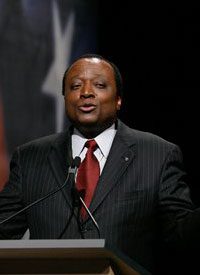
Keyes is a black conservative, still considered something of an oddity in contemporary American politics. He is also a Harvard-educated conservative, something that may be even more rare. He has a Ph.D. in government from Harvard and wrote his dissertation on constitutional theory. He was interim president of Alabama A&M University in 1991. Prior to that he was Assistant Secretary of State for International Organizations, having been appointed to that post by President Ronald Reagan. He later served as ambassador to the United Nations Economic and Social Council, where he represented America’s interests in the General Assembly. Keyes has also been president of Citizens Against Government Waste and was founder of National Taxpayers’ Action Day.
In addition to his government service and political activism, Keyes has built his reputation through books and a syndicated column, and as a radio talk-show host. His books include Masters of the Dream: The Strength and Betrayal of Black America and Our Character, Our Future: Reclaiming America’s Moral Destiny.
As a candidate for elective office, however, Keyes has been shut out, having twice lost as the Republican candidate for U.S. Senate in Maryland. And in 2004, he was the GOP nominee for U.S. Senate in Illinois, taking on the rising young Democratic star, state Sen. Barack Obama. In that campaign, Keyes made the claim that he has reaffirmed in this year’s independent campaign for president, that Jesus wouldn’t vote for Obama.
A vociferous opponent of abortion and euthanasia as well as any effort to legitimize homosexuality, Keyes bases his condemnation of Obama mainly on the Illinois Senator’s pro-abortion stand and his opposition while in the Illinois Senate to legislation to protect infants born alive in abortions.
Though a Catholic, Keyes’s oratorical style is similar to that of many Southern Baptist preachers, his voice rising and arms waving for emphasis as his argument reaches a crescendo. He is often aggressive in debate, frequently clashing both with rival candidates and debate moderators. “Next time, try decaffeinated,” John McCain advised him during a debate in the 2000 campaign. During a 1995 candidates forum in Manchester, N.H., Keyes bristled at WMUR-TV’s Carl Cameron, now with Fox News, when Cameron asked him if he were not trying to “legislate morality.” All sorts of laws reflect moral values, Keyes snapped, arguing that it is virtually impossible to legislate without morality. “So please don’t ask that stupid question again!” he said, defiantly.
At a debate in Iowa late last year, Keyes quarreled at length with the moderator over the amount of time he was given to answer a question about education. John Dickerson of Slate magazine compared the Keyes style to that of another presidential candidate on the stage, former Arkansas Gov. Mike Huckabee, a Southern Baptist minister who is more low-key.
“Huckabee speaks of the Sermon on the Mount,” Dickerson wrote, “while Keyes speaks as if he were delivering thunderbolts from high upon it.”
Keyes gets equally revved up when speaking about fiscal and economic issues, calling for an end to the income tax, which he frequently likens to slavery. “What are we supposed to do now, get down on our knees and thank Massa Bush?” he demanded during the 2000 campaign when George W. Bush proposed a cut in income tax rates. Keyes continues to call for the repeal of the 16th amendment, passed in 1913, which authorized the income tax. He proposes financing the federal government solely through tariffs, customs fees, and a national sales tax of somewhere between 21 and 23 percent. “With limits on both tax revenue and borrowing the federal government would finally be forced to get serious about spending cuts,” Keyes has said.
While he asserts the right of the United States to act unilaterally in its own defense, Keyes also believes in the United Nations as a forum for dealing with international disputes. He has defended the invasion and occupation of Iraq as a means of finding and fighting terrorists overseas rather than waiting for them to strike within the United States.
But it is mainly on the moral issues affecting the social life of the nation that Keyes has taken his stand, emphasizing those issues with a clarity and eloquence that few if any of his fellow conservatives can match.
“When we, though our educational culture, through the media, through the entertainment culture, give our children the impression that human beings cannot control their passions,” said Keyes, “we are telling them, in effect, that human beings cannot be trusted with freedom.”

